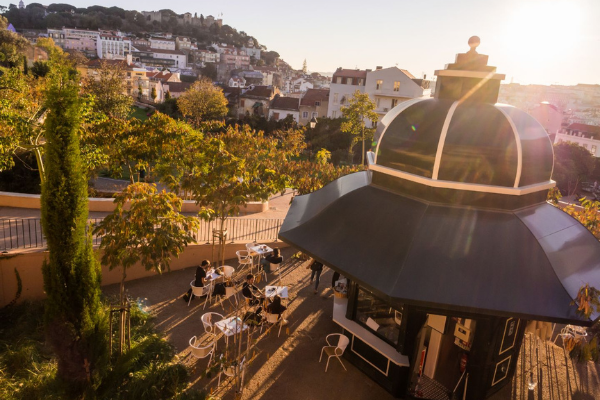
As we reach the last month of the year, it's time not only to take a look at what has happened in recent weeks in terms of transactions in the Portuguese retail system, but also to understand how this area has developed over almost nine months of the pandemic.
As has been the case regularly since the beginning of 2020, the Unicre took advantage of Christmas week to present its latest report as part of its weekly uTalks. REDUNIQ Insights of 2020 (realised in partnership with ROI- Return On Ideas) where it can be seen that, on the whole, the idea emerges that this was a year marked by generalised falls in the turnover of the economic sectors and an exponential increase in the use of the contactless payments
You can follow the entire analysis of the report with Tiago Oom (REDUNIQ) and Rui Dias Alves (ROI) in the video below.
What happened in the pre-Christmas period is symptomatic of this. Between 29 November and 12 December, there was a worsening of transactional results in various categories of the retail system, which went against what would have been the natural consumption trend observed just over a month before Christmas, a period that was initially expected to help recover the brutal losses accumulated since the first State of Emergency.
The accumulated number of transactions and total turnover during this period totalled -12.50% and -18.05%, respectively, compared to the same period in 2019. In the overall RetailAfter a relatively rapid and sharp recovery between May and the end of August, turnover levels have since shown a tendency to stabilise at just over 10% below the same period in the previous year.
November, which is typically the month when the Christmas "phenomenon" kicks off, with an increase in the number of transactions (see red line in the following graph), revealed this year an inability to accelerate consumption. The new restrictions were, according to the report, limiting the relationship with a wide range of categories that should have been able to grow and which, on the contrary, aggravated falls compared to the same period in 2019.
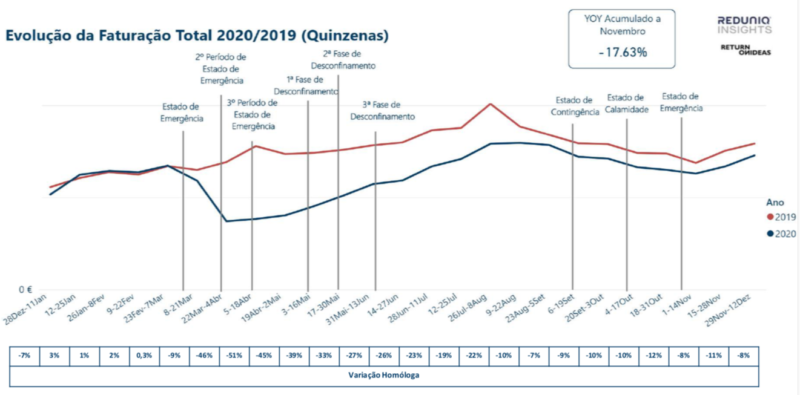
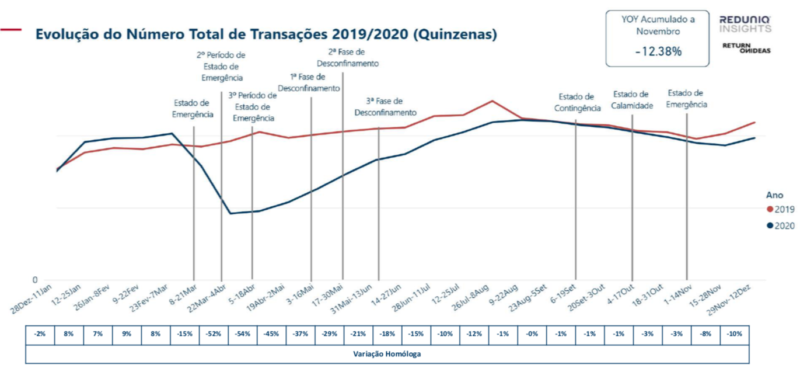
The declines that worsened in November ended up being nationwide, with several districts, such as Braga, Vila Real and Viseu, that had already recovered almost everything once again showing double-digit declines. According to the report, the districts with the biggest losses in accumulated turnover continue to belong to the regions of the country that have felt the drop in tourist numbers the most: Faro, Lisbon, Madeira, Porto and the Azores recorded drops in turnover up to November of 28%, 26%, 21%, 16% and 16%, respectively.
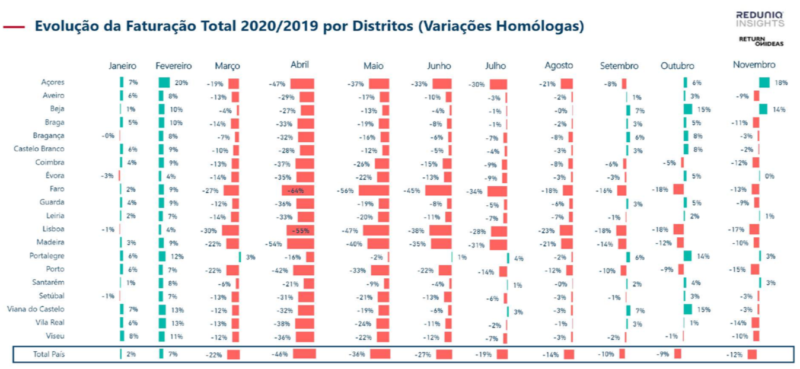
In sectoral terms, the transactional evolution by sector of activity between October and November shows that the categories most affected by the restrictive measures in year-on-year terms were Fashion (which went from -15% to -35%), Restaurants (from -10% to -27%), Petrol Stores (from -7% to -17%), and Perfumeries (from -14% to -22%). Conversely, the Traditional Food Retail and Health businesses increased their turnover from 53% to 70% and from 23% to 36%, respectively. On the other hand, and despite the constraints on opening hours imposed during November, the Hyper and Supermarket sector managed to remain at practically the same levels as in 2019.
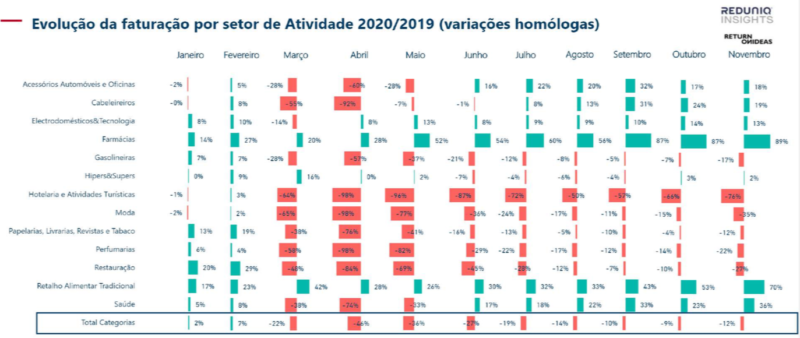
According to the report REDUNIQ InsightsThe falls felt by the various sectors are the clear effect that the measures to combat the pandemic have on Portuguese consumer habits, with the measures to ban driving between municipalities and the curfew on weekends from 1pm having a substantial impact on the Fashion, Perfume, Petrol and Catering categories.
There are also two noteworthy moments. The first relates to the atypical "Black Friday"The second is linked to an acceleration in consumption when comparing the week of 6 to 12 December with the week in which the state of emergency was implemented (9 November). In this comparison, the highlight goes to the growth in turnover of Perfumeries (up 93%), Fashion (up 55%), Hypermarkets and Supermarkets (up 23%), Electrical Appliances & Technology (up 19%) and Traditional Food Retail (up 16%).
The Restoration took advantage of this small wave of growth and, at the start of December, also showed an interesting improvement, with the last Saturday, the 12th, showing the best value recorded on Saturdays since the implementation of the state of emergency, with an increase of 42% compared to the 14th of November.
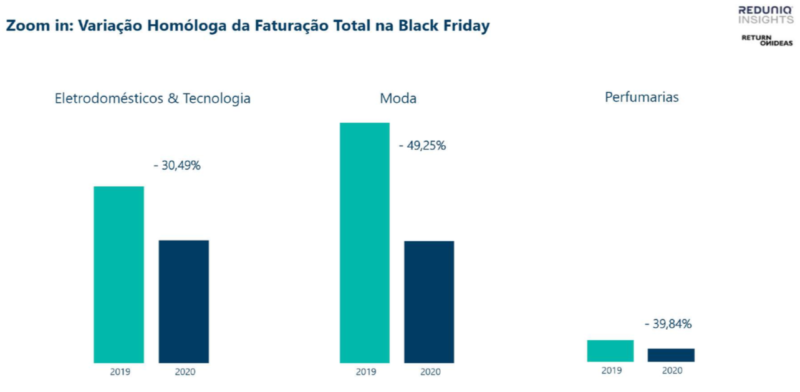
For all these reasons and more, it's hard to say that anything or anyone will come out on top in 2020, but if there is a winner, it would clearly be contactless.
In November, this payment method already accounted for 35% of the total turnover of Portuguese businesses, compared to 34% in the previous month and 8% in the same period of the previous year.
The rapid growth of contactless in 2020 is symptomatic of the democratisation of its use. Its greater hygiene compared to cash (card and terminal don't touch), simplicity of use and security meant that, between March and August, the weight of contactless in total payments doubled, representing more than 1/4 of total invoicing in the eighth month of the year and, as we've already pointed out, more than 1/3 by the end of November. This growth is not expected to stop here, since by the end of this year all credit and debit cards issued in the country will be contactless.
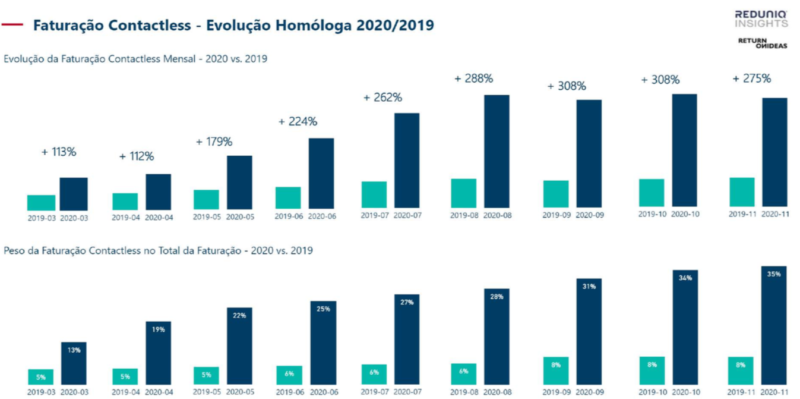
In line with the growth of contactless technologyREDUNIQ offers the TPA solution REDUNIQ SmartThis is a state-of-the-art automatic payment terminal that accepts payments by contactless card, chip or MB Way and allows merchants to develop apps to manage their business from the terminal itself.


